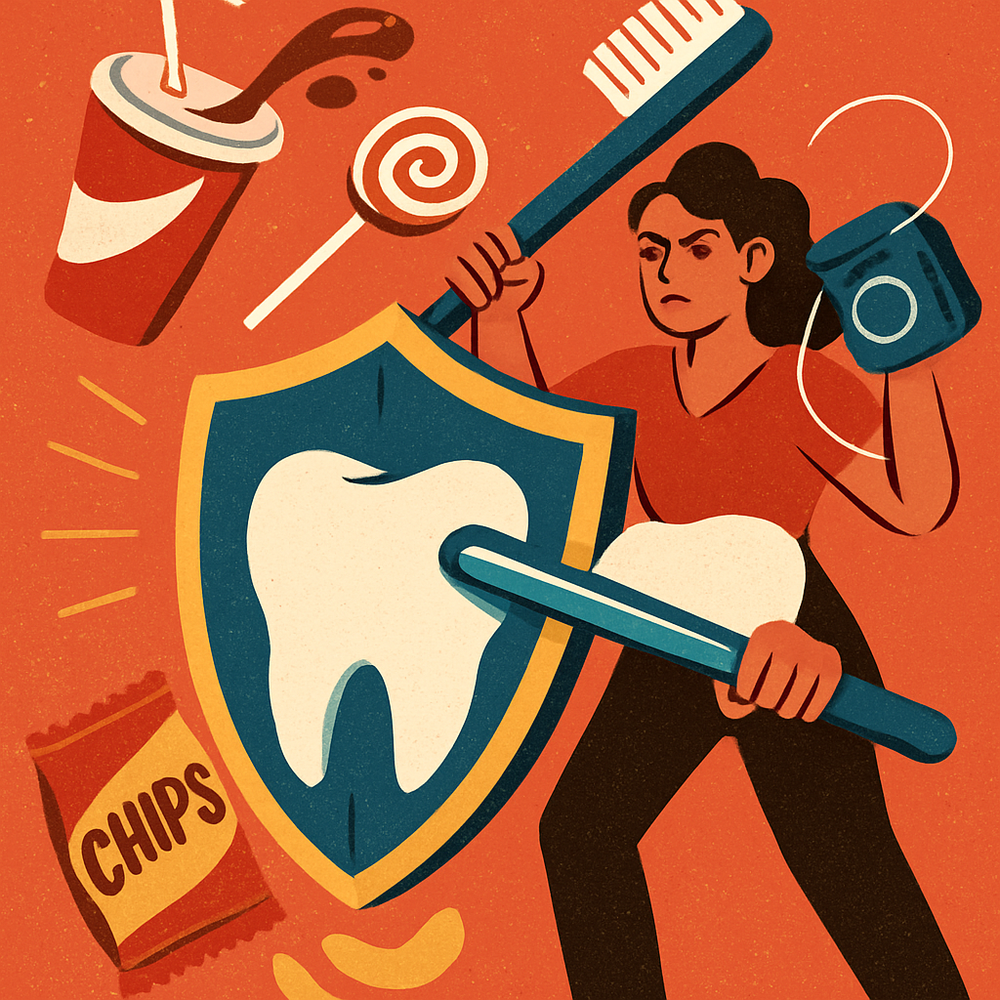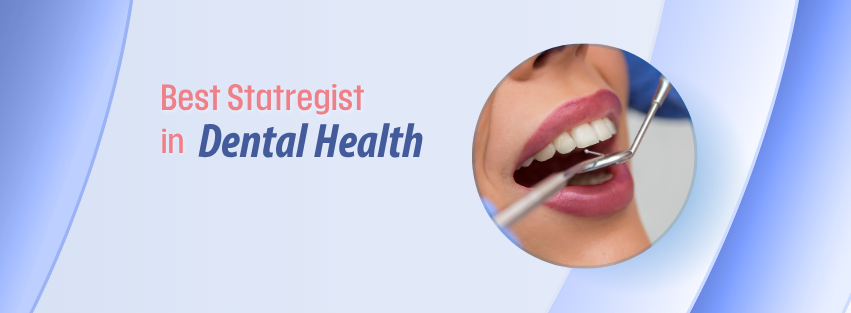
Understanding your dental health: Why Am I So Prone to Cavities?
Dental health is vital to overall well-being, and understanding why you may be prone to cavities can help you take proactive steps to prevent them. Cavities are caused by structural damage to your teeth, and many factors contribute to their development. Here, we’ll explore various reasons that can make some individuals more likely to experience cavities.
Dietary habits:
Your diet plays a significant role in your dental health. Consuming sugary and acidic foods can contribute to tooth decay. When you eat or drink these items, the sugars in them combine with bacteria in your mouth, forming acid. This acid can wear down your enamel, leading to cavities. Here are some dietary aspects to consider:
- High Sugar Intake: Foods such as candies, sodas, and desserts are big culprits.
- Frequent Snacking: Continuous snacking without proper dental hygiene makes your teeth more prone to decay.
- Acidic Foods and Drinks: Citrus fruits, pickles, and soda can erode enamel.
Oral hygiene practices:
Inadequate oral hygiene can lead to the build-up of plaque, a sticky film of bacteria. If plaque isn’t removed through regular brushing and flossing, it can harden into tartar, which requires professional cleaning. Assess your oral hygiene routine:
- Brushing: Are you brushing at least twice daily for two minutes each time?
- Flossing: Do you floss daily to remove food particles and plaque between teeth?
- Regular Dental Visits: Are you visiting your dentist at least twice a year for check-ups and cleanings?
Genetic factors:
Your genetics can influence your oral health. Some individuals may have a natural predisposition to cavities due to:
- Tooth Structure: Some people have naturally weaker enamel or deep grooves in their teeth that can trap food and plaque.
- Saliva Composition: Saliva helps neutralize acids and wash away food particles. If you have less saliva or lower pH levels, you may be more prone to cavities.
Medical conditions and medications:
Certain medical conditions can impact your dental health. Conditions like diabetes can increase your risk of cavities due to high sugar levels in saliva. Additionally, medications that cause dry mouth can also lead to an increased risk of tooth decay. Consider these factors:
- Dry Mouth: Conditions or medications that reduce saliva can leave your teeth vulnerable.
- Chronic Diseases: Diseases that affect your body’s immune response can also make you more susceptible to infections and cavities.
Age and habits:
Your age and daily habits matter too. Children and older adults often face higher risks for cavities due to varying reasons. Kids might not have as thorough brushing habits, while older adults may face enamel wear or have receding gums exposing tooth roots. Additionally, consider the following:
- Frequent Clenching or Grinding: If you grind your teeth, it can cause enamel wear and increase vulnerability.
- Smoking: Tobacco use can lead to poorer oral health and increase cavity risk.
Understanding why you are prone to cavities requires a holistic view of your lifestyle, habits, and health factors. While someone may be genetically predisposed to cavities, other controllable factors, such as diet and oral hygiene, can significantly impact your dental health.
By addressing these aspects, you can take significant steps to protect your teeth and reduce the risk of cavities.
The Role of diet in cavity formation: What you should know.
The food you consume plays a significant role in cavity formation. Understanding this relationship can help you maintain a healthy smile and reduce the risk of cavities.
The primary culprit behind cavities is a group of bacteria in your mouth that thrive on sugars and starches. When these bacteria feed, they produce acid that attacks your tooth enamel. Over time, this can lead to the painful cavities most people dread. Here’s how your diet contributes to this process:
Key factors in diet affecting cavity formation:
- High Sugar Intake: Foods loaded with sugar are the most significant contributors to cavities. When you consume sweets like candies, cookies, and soda, bacteria feast on the leftover sugar stuck to your teeth. This produces harmful acid that erodes enamel.
- Sticky Foods: Foods that cling to your teeth, like dried fruit or gummy candies, can lead to prolonged acid exposure. The longer sugar stays on your teeth, the greater the risk of developing cavities.
- Simple Carbohydrates: Refined carbohydrates—think white bread, pastries, and chips—are easily broken down into sugar by your mouth’s enzymes. This means they can quickly increase the acid production from bacteria.
- Lack of Nutrients: A diet low in important nutrients, such as calcium and phosphorus, can compromise tooth health. These nutrients help in repairing and maintaining tooth structure, thereby reducing cavity risk.
- Inadequate Fiber Intake: Fiber-rich foods, like fruits and vegetables, help stimulate saliva production. Saliva neutralizes acids and contains minerals that strengthen teeth, making fibrous foods a protective choice against cavities.
It’s crucial to be aware of not only what you eat but also how often you eat. Snacking throughout the day can expose your teeth to acids more frequently. The constant cycle of eating and drinking sugary or acidic items can increase your risk of developing cavities.
Healthy dietary habits to prevent cavities:
To minimize the risk of cavities, focus on adopting healthier dietary habits. Here are some effective strategies:
- Limit Sugary Snacks: Reduce the number of sugary snacks you eat. Opt for fruits or nuts instead.
- Drink Plenty of Water: Staying hydrated helps wash away food particles and reduces acid levels in your mouth.
- Choose Whole Grains: Whole grains digest more slowly and have less immediate sugar compared to refined carbs.
- Include Dairy Products: Milk, yogurt, and cheese are excellent sources of calcium that can support your teeth.
- Eat More Vegetables: Crunchy veggies, such as carrots and celery, can help clean your teeth and promote saliva production.
Genetics and cavities: Is there a link?
When you visit the dentist and hear about cavities, you might wonder why some people get them more than others. While diet and oral hygiene play significant roles, there’s another factor that might contribute: genetics. Understanding the genetic influences on cavity formation can help you take better care of your teeth and potentially reduce your risk of dental issues.
Your genes can affect the structure and strength of your teeth. They also influence how your saliva functions. Saliva is essential for oral health as it helps wash away food particles, neutralizes acids, and supplies minerals that strengthen your enamel.
If your genetic makeup leads to lower saliva production or altered saliva composition, you may be more prone to cavities.
Here are some genetic factors that may play a role in cavity susceptibility:
- Tooth Enamel Strength: Some people inherit genes that result in weaker enamel. This makes teeth more vulnerable to decay. When the enamel is thin or damaged, cavities can form more easily.
- Saliva Composition: The proteins and enzymes in your saliva, which can be influenced by genetics, are crucial for protecting your teeth. If your saliva doesn’t have the right balance of these components, you could be at higher risk for cavities.
- Oral Microbiome: Each person has a unique set of bacteria in their mouth. Genetics can impact the types of bacteria that thrive in your mouth, some of which are more likely to cause tooth decay.
- Dietary Preferences: Your genetic makeup may also shape your dietary habits. If your genes drive a preference for sugary foods or carbohydrates, you might encounter more cavities due to the increased sugar exposure to your teeth.
Interestingly, some studies suggest a correlation between genetic predisposition and the development of cavities. Research has indicated that individuals with a family history of dental issues tend to face similar challenges. This means that if your parents or siblings often suffered from cavities, you might also carry a higher risk.
However, genetics is just one part of the equation. While you can’t change your genes, you can adopt habits that enhance your dental health. Here are some proactive steps you can take:
- Maintain Good Oral Hygiene: Brush your teeth at least twice a day using fluoride toothpaste. Floss daily to remove plaque and food particles that brushing can miss.
- Visit the Dentist Regularly: Schedule check-ups every six months. Regular cleanings and evaluations can help catch any issues early.
- Limit Sugary Snacks: Reducing your intake of sugar will decrease the amount of acid that bacteria create in your mouth, thereby lowering your risk of cavities.
- Stay Hydrated: Drinking plenty of water aids saliva production. This helps protect your teeth and wash away food particles.
- Consider Sealants: Dental sealants are thin coatings applied to the chewing surfaces of your back teeth, providing an extra layer of protection against cavities.
Ultimately, understanding the link between genetics and cavities empowers you to make informed choices about your dental care. While you might be predisposed to cavities, implementing effective oral hygiene practices can significantly reduce your risk.
Also, being aware of your family’s dental history can help guide your approach to maintaining your oral health. By actively taking steps to care for your teeth, you can achieve a healthier smile, regardless of your genetic predispositions.
Genetics does play a role in the susceptibility to cavities, but it is by no means the only factor. You have the power to influence your dental health through consistent care and healthy practices. So, take charge of your oral hygiene today to enjoy a lifetime of healthy teeth!
The impact of oral hygiene practices on cavity prevention:
Maintaining good oral hygiene is crucial for preventing cavities and ensuring overall dental health. You might wonder why, despite brushing and flossing, you still face dental issues. Let’s delve into how specific oral hygiene practices can impact cavity prevention and what steps you can take to improve your dental care routine.
Understanding cavities:
Cavities, or dental caries, are damaged areas in your teeth that develop into tiny openings or holes. They occur when plaque, a sticky film of bacteria, forms on your teeth and produces acids that weaken tooth enamel. Understanding this process highlights the importance of effective oral hygiene practices in preventing cavities.
Essential oral hygiene practices:
Implementing the following oral hygiene practices can significantly reduce the risk of cavities:

- Brushing Twice a Day: Make sure you brush your teeth at least twice daily, using fluoride toothpaste. This helps remove plaque and food particles while protecting your enamel.
- Flossing Daily: Flossing removes plaque and food debris stuck between your teeth, a common place for cavities to form. Do this at least once a day.
- Mouthwash Use: An antibacterial mouthwash can further reduce plaque and gum disease by getting to hard-to-reach areas.
- Regular Dental Check-ups: Schedule dental visits every six months for professional cleanings and check-ups. Dentists can catch problems early before they develop into cavities.
- Your Diet Matters: A balanced diet low in sugar can significantly impact your dental health. Limit sugary snacks and beverages that fuel cavity-causing bacteria.
The role of technique in brushing:
Not just frequency, but also how you brush your teeth affects cavity prevention. Here are a few tips to enhance your technique:
- Use the Right Tools: Choose a soft-bristle toothbrush that fits comfortably in your mouth. An electric toothbrush can also make brushing more effective.
- Brush for Two Minutes: Spend at least two minutes brushing your teeth each time. Divide your mouth into quarters and spend 30 seconds on each section to ensure thorough cleaning.
- Angle Matters: Hold your toothbrush at a 45-degree angle to your gums. Brush in circular motions to clean both the teeth and gum line effectively.
Flossing technique:
Flossing is an essential part of cavity prevention. To floss effectively, follow these steps:
- Take about 18 inches of floss and wrap it around your fingers.
- Use your thumbs and forefingers to guide the floss between your teeth gently.
- Curve the floss around the base of each tooth and slide it beneath the gum line to remove plaque.
- Be cautious not to snap the floss, which can harm your gums.
Diet and soft drinks:
Your diet is equally crucial in the fight against cavities. Foods high in sugars can increase the risk of cavities and oral health issues. Here’s what to keep in mind:
- Limit Sugary Snacks: Avoid frequent snacking on sugary treats and drinks. When you eat sugary foods, bacteria break them down and produce acids that harm your teeth.
- Drink Water: Water helps rinse away food particles and sugars. It can also dilute acids in your mouth, so aim to drink plenty of water throughout the day.
- Consume Calcium-Rich Foods: Foods like yogurt, cheese, and leafy greens can strengthen your teeth. Calcium is essential for maintaining strong enamel and reducing cavity risk.
The impact of neglecting oral hygiene:
Neglecting oral hygiene practices can lead to significant dental issues. This includes:
- Increased Risk of Cavities: Failure to brush and floss regularly allows plaque to accumulate, leading to cavities.
- Gum Disease: Poor oral hygiene can lead to gum disease, causing your gums to become inflamed and infected.
- Tooth Loss: If cavities are left untreated, they can lead to extensive decay and even tooth loss over time.
Practicing good oral hygiene is vital for preventing cavities. By embracing effective brushing and flossing techniques, along with a healthy diet, you can safeguard your teeth. Remember, your mouth deserves just as much care as any other part of your body!
By following these tips, you can strengthen your teeth and significantly reduce your risk of cavities. Remember, taking care of your oral health is a lifelong commitment, and every positive step you take counts!
Conclusions:
Understanding why you may be prone to cavities involves examining several interconnected factors. Your dental health reflects a combination of dietary choices, genetic predispositions, and daily oral hygiene practices. By recognizing how these elements contribute to cavity formation, you can take proactive steps to improve your dental care.
Diet plays a crucial role; consuming sugary snacks and beverages increases acid production, leading to tooth decay. Being mindful of your diet and incorporating tooth-friendly foods can significantly reduce your cavity risk.
Additionally, don’t underestimate the effect of genetics. While you can’t change your genes, awareness of your family history can motivate you to be more diligent in your dental care.
Maintaining good oral hygiene is essential in preventing cavities. Brushing twice a day, flossing regularly, and visiting your dentist for cleanings can make a world of difference. These habits help remove plaque and bacteria, protecting your teeth from decay.
